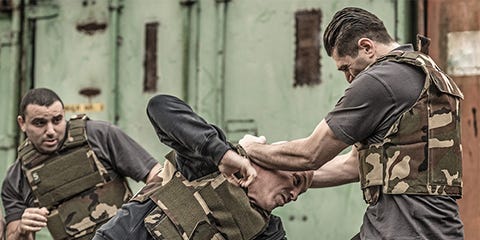Can civilians receive military training?

Military training is supposed to be tough to help recruits become soldiers. Civilians sometimes wonder if they could withstand such grueling training.
Some civilians may also want to improve their physical condition or learn how to handle firearms. So is military training accessible to civilians?
Civilians can get military training through private training courses. Private military trainings for civilians are designed and run by former members of the military, providing a realistic training experience for civilians.

How to follow a military training without committing?
Civilians cannot participate in the same training that recruits undergo during boot camp. The only way to receive military training without committing is to enroll in a private military training course. There is a wide range of training courses.
The most effective military-style training courses are offered by experts in their field, including experts in firearms, close combat, and physical training. Some courses focus on specific skills, such as firearms training or combat techniques.
You can also find training courses that combine skills to recreate the training regimens employed by the Marines or the Army.
These courses often last several days in remote areas. You can even stay in barracks and be woken up each morning by a drill sergeant.
Civilians have access to military training for all types of skill levels. You can decide how intense the experience you want.
For example, if you want to learn how to shoot a gun correctly or develop your self-defense skills, you can take individual lessons or private lessons. If you want an immersive training experience, you may need to enroll in a military-style boot camp.
What type of training do you need to join the army?
Civilians do not need special training before enlisting in any branch of the military. To enlist, you must be enrolled in high school, have a high school diploma or a general education certificate.
Applicants must also pass a physical fitness test. The Army Physical Fitness Test (APFT) requires candidates to do push-ups, sit-ups, and a two-mile run. The US military and other branches also have height, weight, and age requirements. Applicants must be at least 17 years old and under 35 years old.
What is the most difficult training in the army?
Almost all veterans of all branches say their training was the most difficult. The best way to gauge the difficulty of military training is to look at attrition rates. The attrition rate is the percentage of candidates who leave the training before the end.
US Army Special Forces training has one of the highest attrition rates. Each year, approximately 3,000 soldiers apply for special forces. Only about 936 passed through the training in 2019. Of those who attended the training, about 30% complete the training.
The US Navy SEAL team also has a high dropout rate. About 80-85% of applicants do not complete training to become a Navy SEAL. There is, however, a major difference between Special Forces and Navy SEAL training courses.
A large portion of Navy SEAL applicants are civilian recruits, meaning they have no prior military experience. Most Special Forces candidates are enlisted military personnel. They have already undergone basic training.
Although most applicants are already enlisted military with a rank of E-3 or higher, civilian recruits can apply to special forces. However, applicants must be active members of the National Guard and be at least 20 years old.

Can we give up military training?
A recruit can decide to leave the army before, during or after basic training. However, leaving the military is not always easy. Recruits sign a contract with the government, which is difficult to evade after arriving at training.
Before training begins, recruits go through the Delayed Entry Program (DEP). This program allows you to resign by filing a formal request. Although the military is not obligated to accept the request, it usually does.
After training begins, the only way to leave the military is through entry-level separation. Recruits can leave the service without penalty for the first 180 days of their enlistment.
The main caveat is that recruits cannot apply themselves. An entry-level separation must be offered by a commanding officer, advisor, military psychiatrist, or military chaplain.
3 comments
-
Ghyslain on
Besoin d’une formation contre la corruption enfantine et le trafic humain
-
Bélizaire Rivélino on
Des formations pour le civil au Canada exites-tu?

Abygaelle